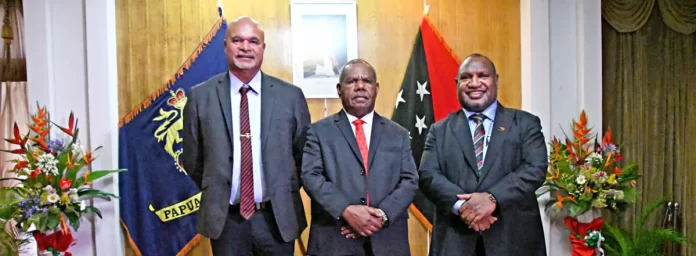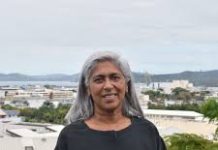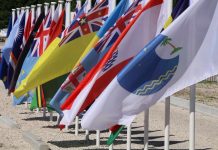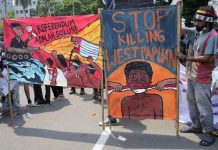By Bethanie Harriman
The Marape-Rosso Government in Papua New Guinea is determined to take “decisive action” and get to the root cause of issues surrounding the Government’s payroll system, that led to the riots in the capital city, Port Moresby on 10 January this year.
The recurring payroll failure that impacted the Defence Force personnel’s remuneration was the main agenda of the recent National Security Council meeting held at the Prime Minister’s office in Port Moresby.
Following that meeting, Prime Minister James Marape has warned those responsible will be held accountable to the fullest extent.
“There is no place in our administration for individuals failing to meet their responsibilities, thereby jeopardising national stability,” said Prime Minister Marape in a recent media statement.
The media release narrates the PNG government’s attempt to restore stability in the country as well as public and business confidence after the Port Moresby riot, where 22 people died and damages amounting to about K1 billion (AUD$ 400 Million) were sustained by businesses.
Police walked off their jobs in January when they found unexplained deductions to their salaries, leaving opportunists to rob and set fire to shopping centres. At that time, the government blamed it on what it called a “glitch” in its payroll system.
In early February, there was also a spill over of violence in the Enga Province of the Highlands region where graphic images were shared of over 20 dead bodies being piled on a police truck.
Both incidents were separate, but provided the catalyst which led to Members of Parliament (MP) crossing the floor to boost Opposition numbers and eventually voting for an alternative Prime Minister, Allan Bird, the Governor of the East Sepik Province.
Votes of No Confidence and instability
On 22 February, the PNG Parliament convened its first sitting for 2024 and a vote of no confidence was tabled by the Opposition. But Parliament was later adjourned to 28 May when Acting Speaker Koni Iguan announced that the no confidence motion did not qualify to be listed on the notice paper.
Prime Minister Marape isn’t off the hook, the Opposition has warned. They will regroup and push through the motion filed on 20 February despite discrepancies raised by the Private Business Committee, as raised by Acting Speaker Iguan.
“At the moment the government has about 80 percent of the Members of Parliament (MPs), more than the 50 percent plus one required to overcome a vote of no confidence, however, PNG politics is very fluid and the MPs can switch to and from the opposition unrestrained,” says political scientist Michael Kabuni.
“The fact that the Pangu-led coalition has the majority of the MPs doesn’t mean the Prime Minister will remain in power,” he says.
The adjournment was seen by many as a way to avoid a vote of no confidence in February. It is unclear whether the Opposition have mustered the numbers to replace Prime Minister James Marape, but the timing of the vote of no confidence attempt in February was very important for them.
As 29 May parliament sitting approaches with the looming vote of no confidence, experts like Michael Kabuni say the chaos on the 10 January was caused by a majority of unemployed youths. He says if nothing is done to address unemployment, these tendencies will persist coupled with the high cost of living and the general frustration over the government’s handling of the economy.
“Solutions to these problems will not be easy, but it’s something the government has to seriously address because the potential for another 10 January riots is real.”
“The looting in Port Moresby was an expression of frustration against increasing cost of living (inflation), a breakdown in law and order, and high unemployment,” says Kabuni.
PNG’s complex leadership dynamics and the region
PNG considers itself as the big brother of the Pacific, but local experts say it is becoming increasingly difficult to sustain that image when the dynamics of its Parliament and unfolding events have a profound impact on domestic stability and also regional influence.
“Political stability in PNG is crucial for stability in the region as PNG has both the largest population, land mass, and economy,” says economist Maholopa Laveil.
“It’s also an influential member of the Pacific Islands Forum (PIFS), thus consistency in leadership creates an environment of certainty on how PNG is perceived and acts on regional issues,” says Laveil.
Laveil says PNG’s regional position is strengthening despite the challenges of political instability, riots and ethnic clashes, the influence comes with key agreements signed between Australia and the U.S, PNG signing onto the Asian Infrastructure Investment Bank (AIIB) also signalling its strategic economic and possibly military importance to China.
“PNG recently hosted numerous foreign leaders, including Indonesia, France, Hungary, Australia, New Zealand, and India. Prime Minister Marape also became the first Pacific leader to address the Australian Parliament,” says Laveil.
The region also closely watches developments in Papua New Guinea, said PIF Secretary General Henry Puna when he conveyed his condolences and sympathies to the government and people of Papua New Guinea in the wake of the violence in Enga.
But, Papua New Guinea anthropologist Dr Linus Digim’Rina says the present governance problems are deeply rooted in tradition and culture which makes leadership in PNG very complex.
“PNG’s standout political character is likely to be one dominated by ethnic parochialism,” says Dr Digim ‘Rina adding the mentality of political leadership is similar to traditional settings of influence where lavish feasts of vegetables and meat are used to show prominence.
He warns that “PNG becomes a milking cow for them” where public funds are being used as development funds for Members of Parliament, where those who remain in the coalition government have access, while nepotism ensures loyalists in key bureaucratic jobs.
Dr Digin’Rima cautioned “other Pacific regional leaders are or should be wary of this.” .
Bethanie Harriman is a freelance journalist, producer and Media & Communications Consultant living and working in the Pacific Region.

















